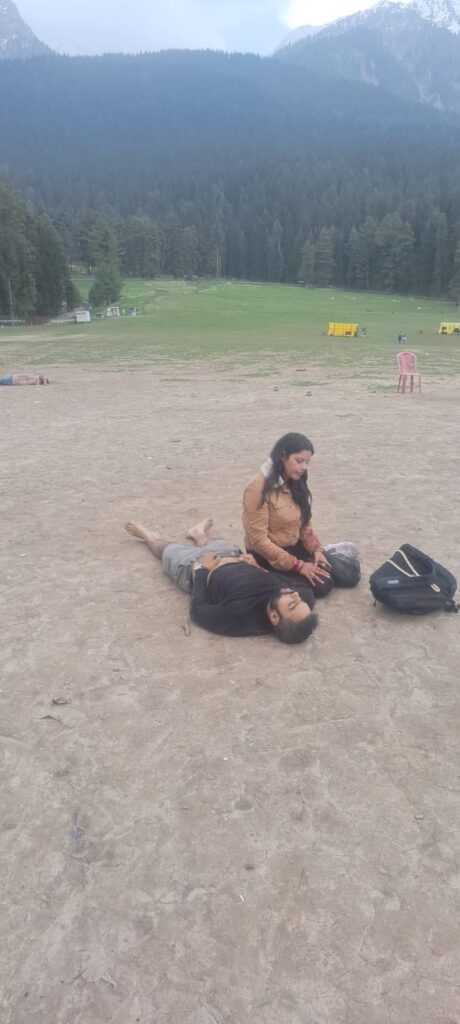Watch the video: Pahalgam Terrorist Attack: 26 Killed in Deadliest Assault on Civilians in Jammu and Kashmir Since 2019

Pahalgam, Jammu and Kashmir, April 22, 2025 – A horrific terrorist attack rocked the serene Baisaran Valley near Pahalgam, a picturesque tourist hotspot in Anantnag district, Jammu and Kashmir, yesterday, claiming the lives of at least 26 people, including tourists, two foreign nationals, and a local. The assault, one of the deadliest in the region since the 2019 Pulwama attack, has sent shockwaves across India and drawn global condemnation. Over 20 others were injured, with several in critical condition.
The Attack: A Brutal Assault on Innocents
At approximately 2:30 PM, a group of 4-6 heavily armed militants, dressed in military fatigues, emerged from the dense forests surrounding Baisaran Valley, often dubbed “mini Switzerland” for its lush meadows and scenic beauty. The attackers, believed to be from The Resistance Front (TRF), a Pakistan-based Lashkar-e-Taiba offshoot, opened indiscriminate fire on tourists and locals enjoying a sunny afternoon of picnics, pony rides, and photography.
Eyewitnesses described scenes of chaos and terror. Survivors reported that the militants selectively targeted non-Muslims, asking victims their names or to recite the Islamic Kalma to verify their religion before shooting. One woman, who lost her husband in the attack, recounted, “They asked his name, realized he was Hindu, and shot him. One of them told me, ‘Go tell this to Modi.’” Another survivor, a tourist from Delhi, hid behind a rock as bullets flew, witnessing families gunned down in cold blood.
Among the victims was Lieutenant Vinay Narwal, a 26-year-old Indian Navy officer from Haryana, who had married just six days earlier on April 16. Narwal was on a honeymoon with his wife when the attackers struck. His death has sparked an outpouring of grief, with tributes highlighting his bravery and service.
Immediate Response: Rescue and Retaliation
The remote location of Baisaran Valley, accessible only by foot or horseback, complicated rescue efforts. Security forces, including the Indian Army, Jammu and Kashmir Police, and para commandos, swiftly cordoned off the area and launched a massive search operation to track the perpetrators. Helicopters and ponies were deployed to evacuate the injured to hospitals in Srinagar and Anantnag. The Anantnag district administration established a 24/7 emergency helpline (e.g., 7006058623, Adil Fareed, ADC Srinagar) to assist affected families and tourists.
The TRF claimed responsibility for the attack via encrypted messaging channels, describing it as a “response to India’s occupation of Kashmir.” Security officials noted that the group has increasingly targeted civilians to disrupt the region’s growing tourism and relative stability following the 2019 revocation of Article 370.
Official Reactions: Condemnation and Action
Prime Minister Narendra Modi, who cut short his visit to Saudi Arabia to return to India, condemned the attack as a “heinous act of cowardice.” In a statement, he vowed, “The perpetrators will face the full might of justice. India stands united against terrorism.”
Union Home Minister Amit Shah flew to Srinagar to chair a high-level security review, while Lieutenant Governor Manoj Sinha assured that “those responsible will be hunted down and punished.”
Jammu and Kashmir Chief Minister Omar Abdullah called the attack “much larger than anything directed at civilians in recent years,” branding the attackers “animals, inhuman, and worthy of contempt.” Political parties across the spectrum, including the National Conference, People’s Democratic Party, and Bharatiya Janata Party, united in condemning the violence.
The attack drew international outrage. US President Donald Trump and Vice President JD Vance, the latter in India during the attack, denounced it as “barbaric.” Leaders from Israel, Sri Lanka, Cyprus, Germany, Australia, and the UAE expressed solidarity, while the UN Secretary-General stated, “Attacks on civilians are unacceptable and must be condemned in the strongest terms.”
Aftermath: Protests, Travel Advisories, and Security Concerns
The attack has disrupted the tourism boom in Jammu and Kashmir, a region that had seen record visitor numbers in recent years. Air India and IndiGo announced additional flights from Srinagar to Delhi and Mumbai on April 23, offering complimentary rescheduling and refunds for travel until April 30. The Anantnag administration urged tourists to contact emergency helplines for assistance.
In Jammu, the Chamber & Bar Association called for a bandh (shutdown) today, April 23, to protest the attack, with support from political and civil society groups. Candlelight vigils and memorials are being organized across India to honor the victims.
The timing of the attack, coinciding with US Vice President JD Vance’s visit and ahead of the Amarnath Yatra pilgrimage, has raised concerns about its geopolitical implications. Security analysts warn that the assault may signal a renewed push by Pakistan-backed groups to destabilize the region. The selective targeting of non-Muslims, if confirmed, could further inflame communal tensions.
Context: A Region on Edge
Jammu and Kashmir has seen a decline in militant activities since the 2019 revocation of Article 370, which stripped the region of its special status. The attack in Pahalgam, a symbol of the region’s tourism revival, highlights the persistent threat of terrorism despite increased security measures. The TRF, formed in 2019, has been linked to several high-profile attacks, often using local recruits to mask its foreign backing.
Moving Forward: A Nation Mourns
As investigations continue, the focus remains on apprehending the attackers and ensuring justice for the victims. The Pahalgam attack has not only shattered families but also challenged India’s efforts to project Jammu and Kashmir as a safe destination. For now, the nation mourns, with tributes pouring in for heroes like Lieutenant Vinay Narwal and the innocent lives lost in a place meant for peace and beauty.
For assistance, contact the Anantnag Police Emergency Help Desk at 7006058623 or other listed helplines. The government has promised swift action, but the scars of April 22 will linger in Pahalgam’s meadows and beyond.






💔 Pahalgam Terror Tragedy 💔
A brutal attack in Baisaran Valley, J&K, claimed 26 innocent lives, including tourists, a Navy officer on his honeymoon, & 2 foreign nationals. Over 20 others injured. 🇮🇳
Militants targeted non-Muslims in a horrifying act of terror. PM Modi, global leaders condemn.
🕊️ India mourns, justice promised.
📞 Emergency Help: 7006058623
#PahalgamAttack #Terrorism #IndiaUnited #PrayForPahalgam